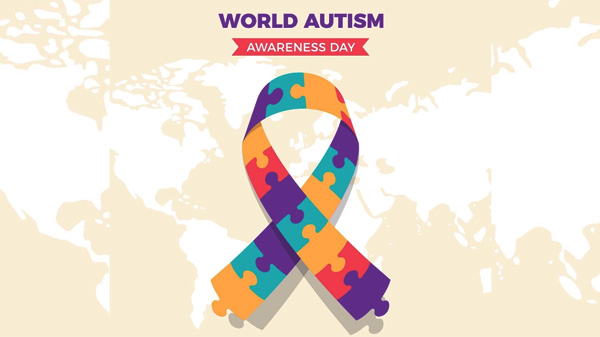What is Autism spectrum disorder? Why is Autism Awareness Important?

- Update Time : Tuesday, 2 April, 2024, 01:08 pm
- 112 Time View

Online Desk: Autism spectrum disorder (ASD) is a complex developmental condition that affects individuals in various ways. Understanding autism and raising awareness about it is crucial to creating a more inclusive and supportive society.
World Autism Awareness Day, observed on April 2, serves as a reminder of understanding and supporting individuals with autism. Let’s delve deeper into the intricacies of autism and why awareness about it is important.
What is Autism?
Autism, also known as autism spectrum disorder (ASD) or autism spectrum condition (ASC), is a neurodevelopmental variation in brain functioning, influencing communication, interaction, and learning patterns. People with autism may have difficulty understanding social cues, expressing themselves verbally or nonverbally, and engaging in repetitive behaviours or interests.
Autism is a spectrum disorder, meaning that it affects each individual differently, ranging from mild to severe. It is crucial to understand that autism is not a sickness; it is a lifelong condition present from birth. Various therapies are available to assist individuals in coping with challenges and leading fulfilling lives.
Signs of Autism
Signs of autism can vary widely among individuals, but common signs include challenges in social interaction, communication difficulties, and repetitive behaviours. Specific signs may include:
– Avoidance of eye contact
– Lack of interest in pointed-out objects
– Delayed language development compared to peers
– Diminished engagement with others
– Preference for objects over people
– Difficulty participating in interactive games
– Heightened or reduced sensitivity to sensory stimuli
– Resistance to changes in routine
– Repetitive and restricted use of toys
– Echoing of words or phrases
– Repetitive movements.
Causes of Autism
The rising rate of autism suggests a complex interplay of factors, with genetics playing a significant role. Scientists have identified rare gene mutations and common genetic variations linked to autism. Emerging research focuses on the interaction between genetic predisposition and environmental influences.
For instance, maternal exposure to harmful substances during pregnancy could contribute to genetic mutations associated with autism. The disorder’s multifaceted nature highlights the need for further investigation.
The Importance of Autism Awareness and Acceptance
Autism awareness plays a crucial role in dispelling myths and misconceptions surrounding the condition, and educating others about its impact. By increasing awareness, we can work towards reducing stigma and discrimination towards individuals on the autism spectrum and their families.
Many autistic individuals face significant challenges in their daily lives, including difficulties with social interaction, communication, and sensory processing. By promoting awareness of these challenges, we can strive to create a more inclusive and supportive society that meets the needs of individuals with autism.
While raising awareness of autism is undoubtedly important, fostering acceptance of autism within society holds even greater significance. Awareness provides knowledge about autism as a condition and acceptance highlights the lived experiences of autistic individuals. They focus on their strengths, talents, and contributions to society.
Autism acceptance involves recognising and appreciating the uniqueness of individuals with autism, accepting them for who they are without attempting to change or “cure” them. Crucially, acceptance fosters self-esteem, self-acceptance, and a sense of belonging among individuals with autism.
Like flowers, acceptance shows the beauty and value of diversity. Just as each flower is unique and beautiful, so too are autistic individuals. For parents and carers, accepting autism can evoke a range of emotions, particularly for those new to the diagnosis. However, embracing their child’s uniqueness can lead to a journey of understanding and even joy.
On April 2, we observe “World Autism Awareness Day” to honour and support autistic individuals while promoting awareness of ASD. There is a growing movement to transition from “awareness” to “understanding” or “acceptance” to align more closely with the preferences of the autistic community.
Ways to Promote the Importance and Awareness of Autism
Educate Yourself
It is essential to stay informed, as awareness starts with individuals taking responsibility for themselves. Take the initiative to educate yourself about autism – what it entails and what it does not – and learn effective ways to interact with autistic individuals.
Approach the topic with an open mind, focusing on their capabilities rather than their challenges. By doing so, you can foster better connections and understanding with people on the autism spectrum.
Spread the Word
One should engage in open discussions about autism to promote understanding and dispel myths. It is necessary to advocate for positive legislation by contacting state representatives and community leaders.
Try to stay informed about policies affecting access to services and encourage others to join advocacy efforts. Every voice counts in ensuring the needs and rights of individuals with autism are respected.
Support Local Events
Numerous organisations host events like autism walks, movie nights, or seminars during April and throughout the year. Individuals should participate, volunteer, or contribute. Engage actively in promoting autism awareness and supporting related activities locally.
Many groups have regional branches and organise events regularly. It would be helpful to involve your family or friends to demonstrate support, learn about their initiatives, and express your compassion. Consider becoming a volunteer with these organisations and events for a deeper involvement.
Be an Advocate
It is important to advocate for autistic individuals and confront negative stereotypes. Encourage inclusion and acceptance within your community. Stand up for both children and adults on the autism spectrum, preventing any derogatory remarks or discrimination.
One can share personal experiences to foster understanding. Ensure equal treatment and respect for individuals with special needs in the workplace. With appropriate support, individuals with autism can achieve success on par with their peers.
Positive Role Model
It is vital to show respect and empathy towards everyone, particularly those who communicate or interact differently. Practise patience and mindfulness in your actions and words regarding autism.
Lead by example for your children and community, demonstrating inclusivity and support for individuals with autism to flourish. Make sure they feel valued and embraced in your daily life, fostering acceptance and inclusion.
Verdict
Autism is a complex neurodevelopmental condition that requires awareness, acceptance, and support from society. By understanding the nature of autism and embracing diversity, we can create a more inclusive world where individuals with autism can thrive.
















